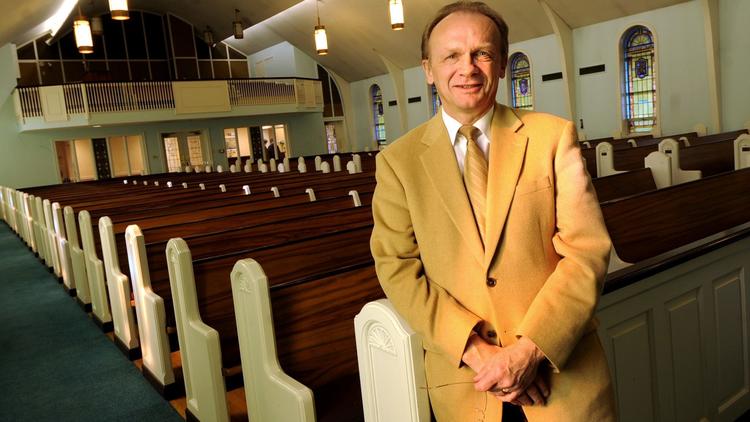Evangelical Lutheran Synod Updating Sexual Misconduct Policy That Doesn't Follow State Law in Part
By Tim Darragh
While six Catholic dioceses across the state await the release of a grand jury report cataloging decades of sexual misconduct by priests, the local synod of the Evangelical Lutheran Church continues to operate under a sexual misconduct policy that doesn’t comply with state law. The policy, posted on the Northeast Synod of the Evangelical Lutheran Church’s website, says those who investigate complaints about sexual misconduct should “consider whether civil authorities need to be informed when the alleged victim(s) is a minor.” Elsewhere on the site, the synod lists the state’s child protective services law, which requires all congregation leaders, paid church employees who work with children, volunteers over age 18 who work with children, Sunday school teachers, nursery attendants, vacation Bible school volunteers and youth group leaders to be “mandated reporters.” Contrary to that passage in the synod’s policy, mandated reporters must contact law enforcement if they suspect abuse of a minor; the law does not allow them to “consider” whether to report it or not. "I spoke with my staff and we’re taking a look at that and updating that,” Bishop Samuel R. Zeiser, head of the synod, said earlier this month, after The Morning Call reporter brought the issue to his attention. Zeiser later pointed out that a different section of the policy — dealing with the initial report of a complaint — is in sync with state law, instructing: “In cases where a minor is the alleged victim, civil authorities, as well as the bishop’s office, need to be contacted immediately.” The last time the policy was updated was 2008 — six years after the Catholic Conference of Bishops wrote its Charter for the Protection of Children and Young People to protect victims after an international abuse scandal rocked the Catholic church. Even as Catholic dioceses were being told to report all abuse allegations to police, the Lutheran synod held on to a policy that left open that option. Policies that gave individuals the option to consider reporting abuse of a minor to authorities contributed to the spread and harm of sexual abuse, said David Corwin, a child forensic psychiatrist and professor at the University of Utah. “We knew enough in 2008 to know that’s a dangerous policy,” he said. Added Janet Rosenzweig, executive director of the American Professional Society on the Abuse of Children: “By 2008, organizations should have known better.” The synod’s current practice, however, is in accord with the law, Zeiser said. The bishop also said there have been no allegations against synod personnel of sexual abusing minors during his tenure. The synod holds “boundary and misconduct” workshops for its clergy, he said, as well as those from churches with which it is in full communion, including regional Moravian, Presbyterian, Episcopal and United Church of Christ denominations and others, he said. The next workshops will be in October. Synod policy allows for disclosure of an allegation of sexual misconduct to the alleged offender’s congregation but not to the wider public. The method for disclosure is chosen on a “case-by-case basis,” the policy says. The bishop also is to contact agencies or congregations in which the alleged offender served, it says. However, disclosure to the media is discouraged. “Neither the synod staff nor the congregation or agency shall initiate disclosure of the rostered leader’s sexual misconduct to the secular or church media,” the policy says. The synod’s approach to publicly divulging allegations of sexual misconduct differs from the Catholic Diocese of Allentown, which generally awaits an investigating agency’s recommendation “on when to make a public announcement so that any announcement does not interfere with the investigation,” spokesman Matt Kerr said. In a recent case, the Erie Diocese publicly released the names of priests and others credibly accused of misconduct or of covering it up. The disclosure came months before the report from a two-year grand jury investigating into six dioceses, including Allentown, was to be released. The state Supreme Court halted that release as it reviews the arguments of unnamed challengers to the report’s disclosure. Richard A. Hammar, a Springfield, Mo., attorney who has written extensively about churches’ legal policies, said best practices for handling allegations of misconduct do not address disclosure to the media. "It’s up to the church," Hammar said. "I’ve seen different responses to that question." Hammar said he prefers disclosure to the news media, however. "It’s helpful because it gives the church an opportunity to speak to the community. If it’s handled properly it could be a good thing," he said. Zeiser said disclosure to a congregation is “an intense thing” that can cause distress and anger that can take years to resolve. In the 10 years he has been bishop of the synod, which covers 14 eastern Pennsylvania counties from Berks to Bradford and ministers to 119,000 people, Zeiser said two people were removed from congregations after they faced credible accusations of sexual misconduct. He declined to identify them or talk about the specifics of either case out of “pastoral concern” for the congregations. The cases did not involve minors, he said. He also said he could not speak about allegations against anyone before he became bishop. The synod provides funds for counseling to those who allege that they were victims of sexual misconduct, he said. “Our staff says nobody should go without counseling because of financial” considerations, Zeiser said. “We would provide whatever it would take.”
|
.
Any original material on these pages is copyright © BishopAccountability.org 2004. Reproduce freely with attribution.
